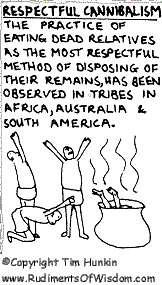
The
Wari' provide possibly the best documentation of socially accepted cannibalism
in modern times. The tribe practiced two forms of cannibalism, warfare
and funerary, until the 1960s when government workers and missionaries
forced them to abandon their practices. The Wari now bury all of their
dead. However, older members of the tribe are uncomfortable with the practice
of burial, considering it to be a less respectful and less comforting way
to treat the death of a loved one.

